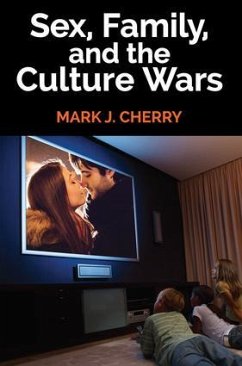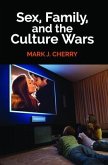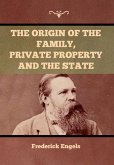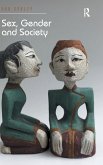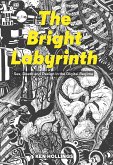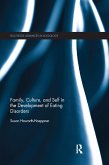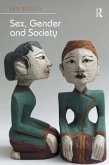Mark J. Cherry
Sex, Family, and the Culture Wars
Mark J. Cherry
Sex, Family, and the Culture Wars
- Broschiertes Buch
- Merkliste
- Auf die Merkliste
- Bewerten Bewerten
- Teilen
- Produkt teilen
- Produkterinnerung
- Produkterinnerung
Extraordinary social and moral shifts have taken place in Western societies
Andere Kunden interessierten sich auch für
![Sex, Family, and the Culture Wars Sex, Family, and the Culture Wars]() Mark J CherrySex, Family, and the Culture Wars197,99 €
Mark J CherrySex, Family, and the Culture Wars197,99 €![The Origin of the Family, Private Property and the State The Origin of the Family, Private Property and the State]() Frederick EngelsThe Origin of the Family, Private Property and the State29,99 €
Frederick EngelsThe Origin of the Family, Private Property and the State29,99 €![Sex, College, and Social Media Sex, College, and Social Media]() Cindy PierceSex, College, and Social Media35,99 €
Cindy PierceSex, College, and Social Media35,99 €![Sex, Gender and Society Sex, Gender and Society]() Ann OakleySex, Gender and Society197,99 €
Ann OakleySex, Gender and Society197,99 €![Bright Labyrinth: Sex, Death and Design in the Digital Regime Bright Labyrinth: Sex, Death and Design in the Digital Regime]() Ken HollingsBright Labyrinth: Sex, Death and Design in the Digital Regime26,99 €
Ken HollingsBright Labyrinth: Sex, Death and Design in the Digital Regime26,99 €![Family, Culture, and Self in the Development of Eating Disorders Family, Culture, and Self in the Development of Eating Disorders]() Susan Haworth-HoeppnerFamily, Culture, and Self in the Development of Eating Disorders65,99 €
Susan Haworth-HoeppnerFamily, Culture, and Self in the Development of Eating Disorders65,99 €![Sex, Gender and Society Sex, Gender and Society]() Ann OakleySex, Gender and Society61,99 €
Ann OakleySex, Gender and Society61,99 €-
-
-
Extraordinary social and moral shifts have taken place in Western societies
Hinweis: Dieser Artikel kann nur an eine deutsche Lieferadresse ausgeliefert werden.
Hinweis: Dieser Artikel kann nur an eine deutsche Lieferadresse ausgeliefert werden.
Produktdetails
- Produktdetails
- Verlag: Taylor & Francis Inc
- Seitenzahl: 364
- Erscheinungstermin: 30. Juni 2016
- Englisch
- Abmessung: 229mm x 152mm x 20mm
- Gewicht: 530g
- ISBN-13: 9781412863315
- ISBN-10: 1412863317
- Artikelnr.: 44323318
- Herstellerkennzeichnung
- Libri GmbH
- Europaallee 1
- 36244 Bad Hersfeld
- gpsr@libri.de
- Verlag: Taylor & Francis Inc
- Seitenzahl: 364
- Erscheinungstermin: 30. Juni 2016
- Englisch
- Abmessung: 229mm x 152mm x 20mm
- Gewicht: 530g
- ISBN-13: 9781412863315
- ISBN-10: 1412863317
- Artikelnr.: 44323318
- Herstellerkennzeichnung
- Libri GmbH
- Europaallee 1
- 36244 Bad Hersfeld
- gpsr@libri.de
Mark J. Cherry
Contents Acknowledgments 1 Sex, Family, and the Culture Wars: An
Introduction 1.1 Sex and the Family 1.2 Traditional versus Post-traditional
Family Life: Contested Grounds in the Culture Wars 1.3 The Family and Its
Role in Human Flourishing 1.4 Shifting Sexual Mores and Uncomfortable
Social Consequences 1.5 A God's Eye Perspective on the Family 1.6 Four
Heuristic Accounts of the Family 1.7 A Final Warning 2 The Family as a
Sociobiological Reality 2.1 Socio-biology and the Human Family 2.2
Altruism, Kinship, and the Family: The Importance of Inclusive Fitness 2.3
Sexual Divergence-Human Reproductive Strategies and Sex Differences 2.4
Conclusion: Heterosexual Normativity, Patriarchal Families, Paternalism,
and Other Political Controversies 3 The Family as a De Facto Category of
Social Reality 3.1 The Family as a Central Category of Experience, Being,
and Knowledge 3.2 The Family as a Sui Generis Category of Social Reality:
The Being of the Family for Thought and Thought's Apprehension of the
Family's Being 3.3 Individual Interactions that Become Familial
Interactions 3.4 Conceptualizing the Social Implications of the
Sociobiological Data 3.5 Conclusion: The Rejection of a Nominalist Account
of the Family 4 God and the Philosopher; Or Why a God's Eye Perspective Is
Necessary to Secure a Particular Account of the Family 4.1 The Necessity of
a God's Eye Perspective 4.2 God's Perspective on Reality as a Regulative
Ideal 4.3 The Atheistic Methodological Postulate versus the Theistic
Methodological Postulate: Competing Views of the Reality of the Family 4.4
Conclusion: Without God Moral Pluralism Cannot Be Resolved 5 The Family as
a Liberal Social-Constructivist Social Entity 5.1 A Moral and Political
Ideological Agenda 5.2 Idealized Liberty and Equality 5.3 Homosexual
Marriage and Other Non-traditional Families 5.4 The Liberation of Children
5.5 The Mature Minor: Conceptual Puzzles 5.6 Conclusion: A Destructive
Ethos 6 Deregulating Family Life: The Family as a Libertarian
Constructivist Social Entity 6.1 Experiments in Living 6.2 Liberty as a
Side Constraint-The Family as a Face-to-Face Voluntary Association 6.3
Families May Have Unequal Power Relationships, Embody Nonliberal Accounts
of the Good, Discriminate, and Violate Redistributive Justice 6.4
Conclusion: The Limits of Legitimate Governmental Authority 7 The Family
and the Fundamentalist Secular State: The Establishment at Law of a Fully
Secular Ideology 7.1 Return to the Culture Wars 7.2 Faith in God versus
Faith in Reason- The Creation of Secularism 7.3 The Attempt to Construct an
International Secular Morality: The Human Rights Agenda 7.4 Deep Moral and
Epistemological Ambiguity: Human Rights as a Modus Vivendi 7.5 Conclusion:
A Secular World in Crisis 8 Sex, Abortion, and Ideological Entrenchment: At
the Brink of Nihilism 8.1 Devout Secularism 8.2 Shifts in Taken-for-Granted
Sexual Mores 8.3 Why Abortion Is Central 8.4 Living Honestly with
Significant Moral Pluralism 8.5 At the Brink of Nihilism: Recapturing the
Family References Index
Introduction 1.1 Sex and the Family 1.2 Traditional versus Post-traditional
Family Life: Contested Grounds in the Culture Wars 1.3 The Family and Its
Role in Human Flourishing 1.4 Shifting Sexual Mores and Uncomfortable
Social Consequences 1.5 A God's Eye Perspective on the Family 1.6 Four
Heuristic Accounts of the Family 1.7 A Final Warning 2 The Family as a
Sociobiological Reality 2.1 Socio-biology and the Human Family 2.2
Altruism, Kinship, and the Family: The Importance of Inclusive Fitness 2.3
Sexual Divergence-Human Reproductive Strategies and Sex Differences 2.4
Conclusion: Heterosexual Normativity, Patriarchal Families, Paternalism,
and Other Political Controversies 3 The Family as a De Facto Category of
Social Reality 3.1 The Family as a Central Category of Experience, Being,
and Knowledge 3.2 The Family as a Sui Generis Category of Social Reality:
The Being of the Family for Thought and Thought's Apprehension of the
Family's Being 3.3 Individual Interactions that Become Familial
Interactions 3.4 Conceptualizing the Social Implications of the
Sociobiological Data 3.5 Conclusion: The Rejection of a Nominalist Account
of the Family 4 God and the Philosopher; Or Why a God's Eye Perspective Is
Necessary to Secure a Particular Account of the Family 4.1 The Necessity of
a God's Eye Perspective 4.2 God's Perspective on Reality as a Regulative
Ideal 4.3 The Atheistic Methodological Postulate versus the Theistic
Methodological Postulate: Competing Views of the Reality of the Family 4.4
Conclusion: Without God Moral Pluralism Cannot Be Resolved 5 The Family as
a Liberal Social-Constructivist Social Entity 5.1 A Moral and Political
Ideological Agenda 5.2 Idealized Liberty and Equality 5.3 Homosexual
Marriage and Other Non-traditional Families 5.4 The Liberation of Children
5.5 The Mature Minor: Conceptual Puzzles 5.6 Conclusion: A Destructive
Ethos 6 Deregulating Family Life: The Family as a Libertarian
Constructivist Social Entity 6.1 Experiments in Living 6.2 Liberty as a
Side Constraint-The Family as a Face-to-Face Voluntary Association 6.3
Families May Have Unequal Power Relationships, Embody Nonliberal Accounts
of the Good, Discriminate, and Violate Redistributive Justice 6.4
Conclusion: The Limits of Legitimate Governmental Authority 7 The Family
and the Fundamentalist Secular State: The Establishment at Law of a Fully
Secular Ideology 7.1 Return to the Culture Wars 7.2 Faith in God versus
Faith in Reason- The Creation of Secularism 7.3 The Attempt to Construct an
International Secular Morality: The Human Rights Agenda 7.4 Deep Moral and
Epistemological Ambiguity: Human Rights as a Modus Vivendi 7.5 Conclusion:
A Secular World in Crisis 8 Sex, Abortion, and Ideological Entrenchment: At
the Brink of Nihilism 8.1 Devout Secularism 8.2 Shifts in Taken-for-Granted
Sexual Mores 8.3 Why Abortion Is Central 8.4 Living Honestly with
Significant Moral Pluralism 8.5 At the Brink of Nihilism: Recapturing the
Family References Index
Contents Acknowledgments 1 Sex, Family, and the Culture Wars: An
Introduction 1.1 Sex and the Family 1.2 Traditional versus Post-traditional
Family Life: Contested Grounds in the Culture Wars 1.3 The Family and Its
Role in Human Flourishing 1.4 Shifting Sexual Mores and Uncomfortable
Social Consequences 1.5 A God's Eye Perspective on the Family 1.6 Four
Heuristic Accounts of the Family 1.7 A Final Warning 2 The Family as a
Sociobiological Reality 2.1 Socio-biology and the Human Family 2.2
Altruism, Kinship, and the Family: The Importance of Inclusive Fitness 2.3
Sexual Divergence-Human Reproductive Strategies and Sex Differences 2.4
Conclusion: Heterosexual Normativity, Patriarchal Families, Paternalism,
and Other Political Controversies 3 The Family as a De Facto Category of
Social Reality 3.1 The Family as a Central Category of Experience, Being,
and Knowledge 3.2 The Family as a Sui Generis Category of Social Reality:
The Being of the Family for Thought and Thought's Apprehension of the
Family's Being 3.3 Individual Interactions that Become Familial
Interactions 3.4 Conceptualizing the Social Implications of the
Sociobiological Data 3.5 Conclusion: The Rejection of a Nominalist Account
of the Family 4 God and the Philosopher; Or Why a God's Eye Perspective Is
Necessary to Secure a Particular Account of the Family 4.1 The Necessity of
a God's Eye Perspective 4.2 God's Perspective on Reality as a Regulative
Ideal 4.3 The Atheistic Methodological Postulate versus the Theistic
Methodological Postulate: Competing Views of the Reality of the Family 4.4
Conclusion: Without God Moral Pluralism Cannot Be Resolved 5 The Family as
a Liberal Social-Constructivist Social Entity 5.1 A Moral and Political
Ideological Agenda 5.2 Idealized Liberty and Equality 5.3 Homosexual
Marriage and Other Non-traditional Families 5.4 The Liberation of Children
5.5 The Mature Minor: Conceptual Puzzles 5.6 Conclusion: A Destructive
Ethos 6 Deregulating Family Life: The Family as a Libertarian
Constructivist Social Entity 6.1 Experiments in Living 6.2 Liberty as a
Side Constraint-The Family as a Face-to-Face Voluntary Association 6.3
Families May Have Unequal Power Relationships, Embody Nonliberal Accounts
of the Good, Discriminate, and Violate Redistributive Justice 6.4
Conclusion: The Limits of Legitimate Governmental Authority 7 The Family
and the Fundamentalist Secular State: The Establishment at Law of a Fully
Secular Ideology 7.1 Return to the Culture Wars 7.2 Faith in God versus
Faith in Reason- The Creation of Secularism 7.3 The Attempt to Construct an
International Secular Morality: The Human Rights Agenda 7.4 Deep Moral and
Epistemological Ambiguity: Human Rights as a Modus Vivendi 7.5 Conclusion:
A Secular World in Crisis 8 Sex, Abortion, and Ideological Entrenchment: At
the Brink of Nihilism 8.1 Devout Secularism 8.2 Shifts in Taken-for-Granted
Sexual Mores 8.3 Why Abortion Is Central 8.4 Living Honestly with
Significant Moral Pluralism 8.5 At the Brink of Nihilism: Recapturing the
Family References Index
Introduction 1.1 Sex and the Family 1.2 Traditional versus Post-traditional
Family Life: Contested Grounds in the Culture Wars 1.3 The Family and Its
Role in Human Flourishing 1.4 Shifting Sexual Mores and Uncomfortable
Social Consequences 1.5 A God's Eye Perspective on the Family 1.6 Four
Heuristic Accounts of the Family 1.7 A Final Warning 2 The Family as a
Sociobiological Reality 2.1 Socio-biology and the Human Family 2.2
Altruism, Kinship, and the Family: The Importance of Inclusive Fitness 2.3
Sexual Divergence-Human Reproductive Strategies and Sex Differences 2.4
Conclusion: Heterosexual Normativity, Patriarchal Families, Paternalism,
and Other Political Controversies 3 The Family as a De Facto Category of
Social Reality 3.1 The Family as a Central Category of Experience, Being,
and Knowledge 3.2 The Family as a Sui Generis Category of Social Reality:
The Being of the Family for Thought and Thought's Apprehension of the
Family's Being 3.3 Individual Interactions that Become Familial
Interactions 3.4 Conceptualizing the Social Implications of the
Sociobiological Data 3.5 Conclusion: The Rejection of a Nominalist Account
of the Family 4 God and the Philosopher; Or Why a God's Eye Perspective Is
Necessary to Secure a Particular Account of the Family 4.1 The Necessity of
a God's Eye Perspective 4.2 God's Perspective on Reality as a Regulative
Ideal 4.3 The Atheistic Methodological Postulate versus the Theistic
Methodological Postulate: Competing Views of the Reality of the Family 4.4
Conclusion: Without God Moral Pluralism Cannot Be Resolved 5 The Family as
a Liberal Social-Constructivist Social Entity 5.1 A Moral and Political
Ideological Agenda 5.2 Idealized Liberty and Equality 5.3 Homosexual
Marriage and Other Non-traditional Families 5.4 The Liberation of Children
5.5 The Mature Minor: Conceptual Puzzles 5.6 Conclusion: A Destructive
Ethos 6 Deregulating Family Life: The Family as a Libertarian
Constructivist Social Entity 6.1 Experiments in Living 6.2 Liberty as a
Side Constraint-The Family as a Face-to-Face Voluntary Association 6.3
Families May Have Unequal Power Relationships, Embody Nonliberal Accounts
of the Good, Discriminate, and Violate Redistributive Justice 6.4
Conclusion: The Limits of Legitimate Governmental Authority 7 The Family
and the Fundamentalist Secular State: The Establishment at Law of a Fully
Secular Ideology 7.1 Return to the Culture Wars 7.2 Faith in God versus
Faith in Reason- The Creation of Secularism 7.3 The Attempt to Construct an
International Secular Morality: The Human Rights Agenda 7.4 Deep Moral and
Epistemological Ambiguity: Human Rights as a Modus Vivendi 7.5 Conclusion:
A Secular World in Crisis 8 Sex, Abortion, and Ideological Entrenchment: At
the Brink of Nihilism 8.1 Devout Secularism 8.2 Shifts in Taken-for-Granted
Sexual Mores 8.3 Why Abortion Is Central 8.4 Living Honestly with
Significant Moral Pluralism 8.5 At the Brink of Nihilism: Recapturing the
Family References Index

